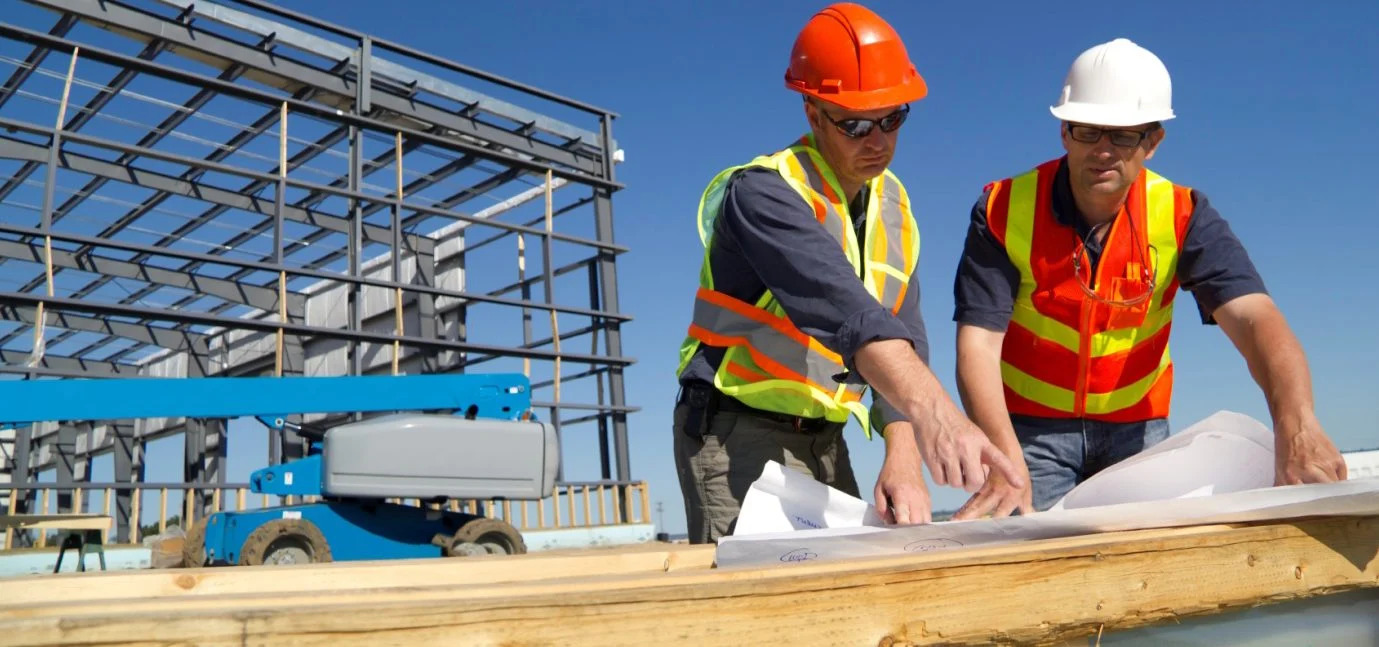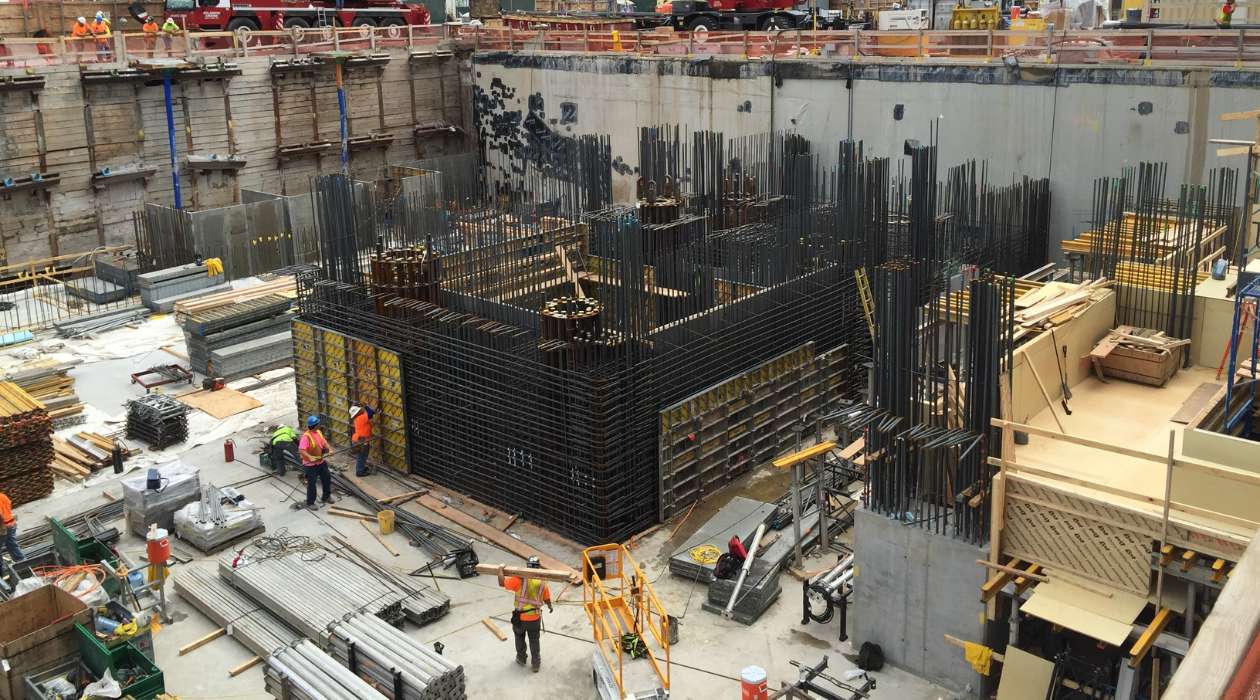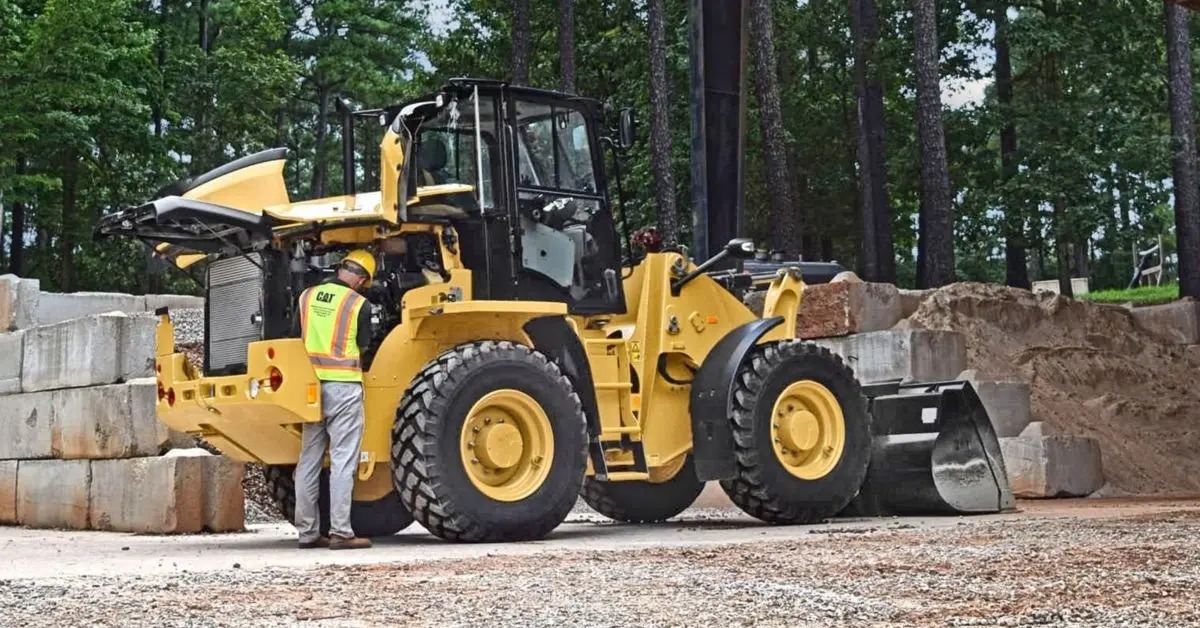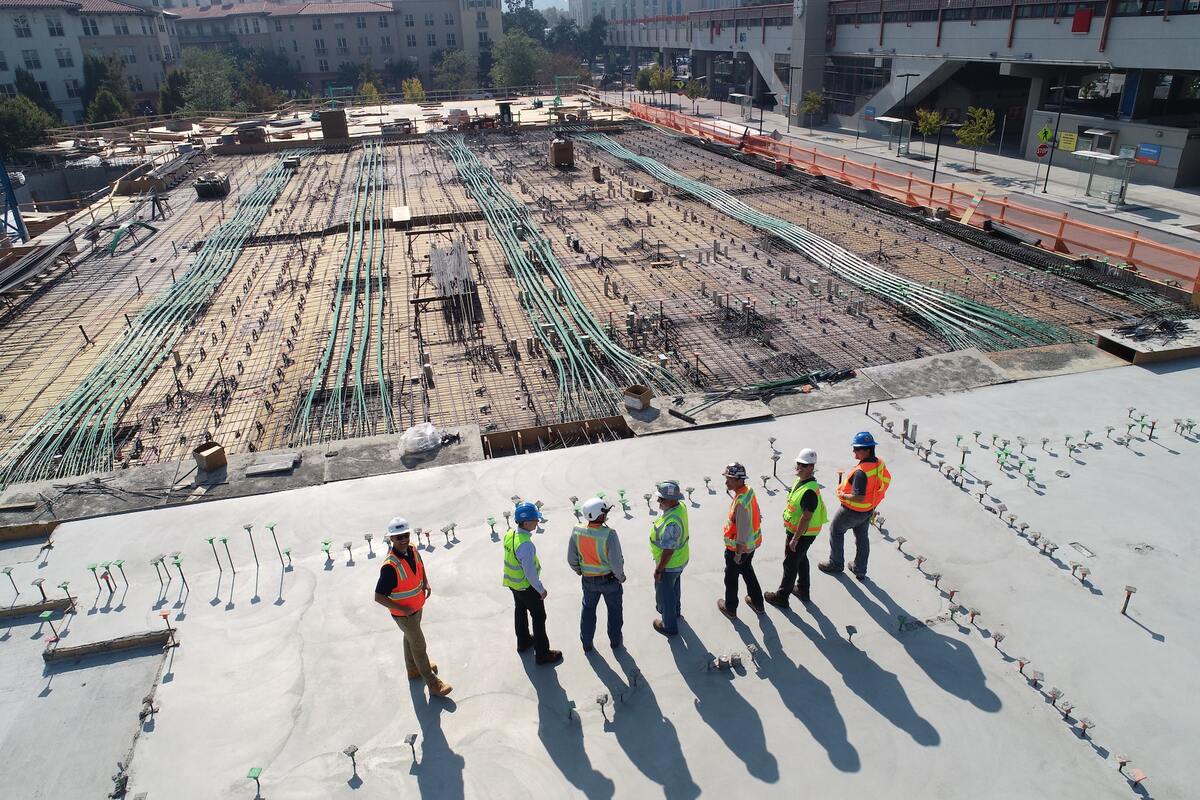Home>diy>Building & Construction>How To Make Your Construction Company Grow


Building & Construction
How To Make Your Construction Company Grow
Modified: October 20, 2024
Learn powerful strategies to make your building construction company grow. Find out how to increase profits, attract new clients, and expand your business in the competitive construction industry.
(Many of the links in this article redirect to a specific reviewed product. Your purchase of these products through affiliate links helps to generate commission for Storables.com, at no extra cost. Learn more)
Introduction
Welcome to the world of construction, where strong foundations are built both literally and metaphorically. As a construction company, your primary goal is to create remarkable structures, but to achieve success in this competitive industry, you must also focus on growing your business.
Expanding your construction company is no easy task, but with the right strategies and a well-executed plan, you can overcome challenges and thrive in the market. This article will provide you with valuable insights and actionable tips on how to make your construction company grow.
Whether you are a small startup or an established firm, these suggestions will help you elevate your business to new heights. So, let’s dive in and explore the key areas to focus on for your company’s growth.
Key Takeaways:
- Establishing a strong online presence, building client relationships, and enhancing marketing strategies are crucial for the growth of a construction company in today’s digital age.
- Prioritizing customer satisfaction, investing in employee training, and implementing cost-saving measures are essential for long-term success and profitability in the construction industry.
Read more: How To Own Your Own Construction Company
Establish a Strong Online Presence
In today’s digital age, having a strong online presence is crucial for the growth of any business, and the construction industry is no exception. Building a website for your construction company is the first step in establishing your online presence.
Your website should be visually appealing, informative, and easy to navigate. It should showcase your previous projects, highlight your expertise, and provide potential clients with all the necessary contact information. Optimizing your website for search engines is also essential to increase your visibility and attract organic traffic.
In addition to a website, consider creating profiles on popular social media platforms such as LinkedIn, Facebook, and Instagram. These platforms provide an opportunity to engage with your target audience and showcase your work through photos, videos, and testimonials. Regularly updating your social media accounts with relevant content will help you build brand recognition and attract new clients.
Another effective way to establish an online presence is through content marketing. Create a blog on your website and regularly publish articles related to the construction industry. Share valuable tips, industry insights, and success stories to position yourself as an authority in your field.
Don’t forget to leverage online directories and review platforms. Claim your business listings on platforms like Google My Business and Yelp to ensure accuracy and encourage customers to leave positive reviews.
In summary, establishing a strong online presence is crucial for the growth of your construction company. Create a visually appealing website, leverage social media platforms, engage in content marketing, and utilize online directories and reviews to maximize your online visibility and attract potential clients.
Build a Solid Network of Clients and Partnerships
In the construction industry, building strong relationships with clients and partners is essential for long-term success and growth. A solid network of clients and partnerships can lead to repeat business, referrals, and new project opportunities.
One way to build a client network is to provide exceptional customer service. Deliver projects on time and within budget, communicate effectively with clients, and address any concerns promptly. Satisfied clients are more likely to become repeat customers and recommend your services to others.
Networking is another crucial aspect of building a client and partnership network. Attend industry conferences, trade shows, and networking events to meet potential clients and industry professionals. Engage in meaningful conversations and develop relationships based on trust and mutual benefit.
Don’t underestimate the power of referrals. Encourage satisfied clients to refer your services to others by offering incentives or expressing gratitude. Word-of-mouth recommendations can significantly expand your client base and boost your company’s reputation.
Furthermore, establishing partnerships with other professionals in the construction industry can open doors to new opportunities. Collaborate with architects, engineers, suppliers, and subcontractors to form strategic alliances. These partnerships can lead to joint ventures, shared resources, and access to new markets.
When building partnerships, ensure that they align with your company’s values and goals. Assess the credibility and reliability of potential partners and establish clear expectations from the beginning. Communicate openly and foster a spirit of collaboration to ensure the success of the partnership.
In summary, building a solid network of clients and partnerships is crucial for the growth of your construction company. Focus on providing exceptional customer service, network with industry professionals, leverage referrals, and form strategic partnerships to expand your client base and create new business opportunities.
Enhance Your Marketing Strategies
Effective marketing is vital for the growth and success of any construction company. It allows you to reach a wider target audience, differentiate your brand from competitors, and generate valuable leads. Here are some strategies to enhance your marketing efforts:
Define Your Target Audience: Before implementing any marketing strategy, it’s essential to identify your target audience. Understand their needs, preferences, and pain points to tailor your messaging and offerings accordingly.
Digital Marketing: In today’s digital landscape, utilizing digital marketing strategies is indispensable. Develop a comprehensive digital marketing plan that includes search engine optimization (SEO), social media marketing, content marketing, and email campaigns. Optimize your website for relevant keywords, maintain an active presence on social media, and create engaging and informative content to attract and engage potential customers.
Referral Program: Encourage satisfied clients to refer your services to others by implementing a referral program. Offer incentives, discounts, or rewards for successful referrals. This not only helps in expanding your client base but also builds trust and loyalty with existing clients.
Online Reviews and Testimonials: Positive online reviews and testimonials can significantly impact the perception of your construction company. Encourage satisfied clients to leave reviews on platforms like Google, Yelp, or industry-specific directories. Display these testimonials prominently on your website to build credibility and trust with prospective clients.
Branding and Differentiation: Develop a strong brand identity that sets your construction company apart from competitors. Clearly communicate your unique value proposition and showcase your expertise, experience, and quality of work. Consistently reinforce your brand message across all marketing channels to establish brand recognition and trust.
Participate in Industry Events: Attend trade shows, conferences, and other industry events to showcase your work, network with potential clients and partners, and stay updated on industry trends. Consider hosting workshops or speaking engagements to position yourself as an industry expert.
Track and Analyze Results: Regularly monitor and analyze the performance of your marketing campaigns. Track website traffic, lead generation, conversion rates, and customer feedback. Use these insights to refine your marketing strategies and optimize your efforts for better results.
By enhancing your marketing strategies, you can effectively promote your construction company, increase brand awareness, and generate new leads. Remember to adapt to changing market trends and continually evaluate and refine your marketing efforts for maximum impact.
Invest in Employee Training and Development
The success of your construction company heavily relies on the skills and expertise of your employees. By investing in their training and development, you can enhance their performance, boost morale, and foster a culture of continuous improvement. Here are some ways to invest in your employees:
Identify Skills Gaps: Conduct regular assessments to identify the skills gaps within your workforce. This will help you determine the areas where additional training and development are needed.
Provide Technical Training: The construction industry is constantly evolving, with new technologies, techniques, and regulations emerging. Provide your employees with technical training to keep up with the latest advancements in the field. This can include seminars, workshops, and certifications.
Encourage Professional Development: Support your employees’ professional growth by encouraging them to pursue further education and certifications. Provide them with resources and opportunities to expand their knowledge and skills in areas such as project management, leadership, and quality control.
Mentoring and Coaching: Establish mentorship programs or assign senior employees as mentors to junior staff members. This not only facilitates knowledge transfer but also fosters a collaborative and supportive work environment.
Cross-Training: Provide opportunities for employees to gain experience in different areas of construction. Cross-training helps employees expand their skill sets, increases their versatility, and improves overall team performance.
Leadership Development: Identify employees with leadership potential and provide them with the necessary training and mentorship to develop their leadership skills. This will enable them to take on more responsibility and contribute to the growth and success of the company.
Recognition and Rewards: Reward and recognize employees who demonstrate exceptional performance and contribution. This can be in the form of bonuses, promotions, or public recognition. It will not only motivate the individual but also inspire other employees to strive for excellence.
Continuous Learning Culture: Foster a culture of continuous learning and improvement within your organization. Encourage employees to actively seek new knowledge and share their expertise with others. Provide resources such as access to industry publications, online courses, and conferences.
Investing in employee training and development demonstrates your commitment to their growth and success. It enhances their skills, boosts job satisfaction, and ultimately improves the overall performance of your construction company. Remember, knowledge is power, and by empowering your employees, you are investing in the future of your business.
Read more: What Makes A Successful Construction Company
Expand Your Service Offerings
To fuel the growth of your construction company, it’s important to continually evaluate and expand your service offerings. By diversifying your portfolio, you can tap into new markets, attract a broader range of clients, and increase revenue streams. Here are some strategies to consider when expanding your service offerings:
Market Research: Conduct thorough market research to identify emerging trends and opportunities. Analyze the needs and demands of your target audience, as well as the competition. This will help you identify gaps in the market that you can capitalize on with new services.
Offer Specialized Services: Consider expanding into specialized areas within the construction industry. This could include green building, sustainable design, historic restoration, or energy-efficient construction. Developing expertise in niche areas can help you stand out from the competition and attract clients who require specific services.
Introduce Maintenance and Repair Services: In addition to new construction projects, offer maintenance and repair services to your clients. This can include regular inspections, preventive maintenance programs, and emergency repair services. Providing ongoing support to your clients can lead to long-term relationships and repeat business.
Add Design-Build Services: If you currently focus on general contracting, consider adding design-build services to your offerings. This approach allows you to manage the entire project from concept to completion, giving clients a seamless and efficient experience.
Explore New Construction Sectors: Assess other construction sectors that may align with your expertise and resources. For example, if you primarily work on residential projects, you could explore opportunities in commercial construction or infrastructure development.
Partner with Other Professionals: Collaborate with architects, engineers, interior designers, or other professionals to offer comprehensive services. By forming strategic partnerships, you can provide clients with a one-stop-shop and streamline the project process.
Invest in Technology: Evaluate and invest in innovative construction technologies and methodologies. For example, you could explore the use of Building Information Modeling (BIM), virtual reality (VR), or drone technology. Incorporating these technologies into your service offerings can improve efficiency, accuracy, and client satisfaction.
Obtain Necessary Certifications and Licenses: Ensure that you have the necessary certifications and licenses to offer new services. Stay updated with industry regulations and requirements to expand into specialized areas without legal obstacles.
Expanding your service offerings requires careful planning, research, and strategic decision-making. By diversifying your services, you can attract new clients, create additional revenue streams, and position your construction company as a versatile and comprehensive solution provider in the industry.
Focus on building strong relationships with your clients and delivering exceptional service. Satisfied clients are more likely to recommend your construction company to others, leading to growth through word-of-mouth referrals.
Foster a Culture of Innovation
Innovation is the driving force behind growth and success in the construction industry. By fostering a culture of innovation within your construction company, you can stay ahead of the competition, improve efficiency, and deliver cutting-edge solutions to your clients. Here are some strategies to promote innovation within your organization:
Encourage Idea Sharing: Create an environment where employees feel comfortable sharing their ideas and suggestions. Foster open communication channels and implement regular brainstorming sessions to encourage creative thinking and problem-solving.
Embrace Technology: Stay up-to-date with the latest construction technologies and tools. Embrace digital solutions such as project management software, virtual reality (VR), and 3D modeling. Encourage employees to explore and integrate new technologies into their workflows to enhance efficiency and accuracy.
Allocate Resources for Research and Development: Dedicate time and resources for research and development activities. This can include conducting market research, exploring new materials and methods, and experimenting with innovative construction techniques. Set aside a budget for innovation projects and provide support to employees to pursue innovative ideas.
Create Collaborative Spaces: Designate areas within your office or construction sites for collaboration and creativity. Provide employees with comfortable and inspiring spaces where they can brainstorm and collaborate on innovative solutions. Encourage cross-departmental collaboration to leverage the diverse expertise within your organization.
Recognize and Reward Innovation: Establish a system to recognize and reward employees who contribute innovative ideas or solutions. Acknowledge their efforts and the impact they have on the company’s growth. This can include rewards, bonuses, or opportunities for career advancement.
Continual Learning and Professional Development: Encourage employees to continue expanding their skill sets and stay updated with industry trends. Support their participation in professional development programs, workshops, and conferences. Provide access to educational resources and encourage employees to pursue relevant certifications.
Collaborate with External Innovators: Partner with external organizations, startups, or research institutions to leverage their expertise and access cutting-edge ideas. Collaborations with universities or industry associations can lead to valuable insights and opportunities for innovation.
Establish an Innovation Committee: Create a dedicated innovation committee or team to drive innovation initiatives within your company. This team can be responsible for evaluating ideas, implementing innovation projects, and measuring their impact.
Fostering a culture of innovation requires commitment and consistent effort. By encouraging idea sharing, embracing technology, allocating resources for research and development, creating collaborative spaces, recognizing innovation, investing in employee development, collaborating with external innovators, and establishing an innovation committee, you can nurture a culture of innovation within your construction company. This will lead to continuous improvement, growth, and a competitive edge in the industry.
Improve Project Management Efficiency
Efficient project management is crucial for the success of any construction company. By optimizing your project management processes, you can increase productivity, minimize delays, and enhance client satisfaction. Here are some strategies to improve project management efficiency:
Set Clear Goals and Expectations: Clearly define project goals, objectives, and deliverables from the start. Communicate expectations with your team and ensure everyone understands their roles and responsibilities.
Utilize Project Management Software: Invest in project management software to streamline communication, track progress, and manage tasks more effectively. These tools provide real-time updates, task management features, and document sharing capabilities that improve collaboration and efficiency.
Implement Agile Project Management: Adopt an agile approach to project management, where projects are broken down into smaller, manageable tasks. This allows for flexibility, faster decision-making, and better adaptation to changing client requirements.
Create a Detailed Project Schedule: Develop a comprehensive project schedule that outlines all the tasks, deadlines, and dependencies. Regularly update and monitor the schedule to identify potential bottlenecks and make necessary adjustments.
Effective Communication: Establish clear communication channels for sharing project updates, addressing issues, and facilitating collaboration. Emphasize regular team meetings, transparent communication, and documentation of project decisions and changes.
Streamline Documentation Processes: Implement standardized templates and documentation processes to save time and ensure consistency. Develop a centralized repository for project-related documents, drawings, and specifications for easy accessibility.
Monitor and Control Costs: Implement effective cost management practices to control project expenses. Regularly track and analyze project costs to ensure they align with the budget, and identify areas where cost-saving measures can be implemented.
Risk Management: Proactively identify and manage project risks to avoid potential disruptions. Conduct thorough risk assessments and develop mitigation strategies. Regularly reassess risks throughout the project lifecycle and implement necessary measures to minimize their impact.
Empower Your Team: Trust your team members and empower them to make decisions within their scope of responsibility. Foster a collaborative and supportive work environment that encourages innovation, creativity, and problem-solving.
Continuous Improvement: Encourage a culture of continuous improvement by regularly evaluating your project management processes. Collect feedback from team members, analyze project performance metrics, and identify areas for improvement. Implement lessons learned from previous projects to enhance future project outcomes.
By implementing these strategies, you can significantly improve project management efficiency within your construction company. Better project planning, effective communication, streamlined processes, and a focus on continuous improvement will lead to successful project outcomes, satisfied clients, and increased profitability.
Implement Cost-saving Measures
In the competitive construction industry, implementing cost-saving measures is crucial to maintain profitability and financial stability. By identifying areas where expenses can be reduced without compromising quality, you can optimize your operations and improve your bottom line. Here are some strategies to implement cost-saving measures:
Optimize Resource Allocation: Analyze your resource allocation, including labor, equipment, and materials. Optimize scheduling and maximize the utilization of resources to minimize waste and inefficiencies.
Negotiate with Suppliers: Build strong relationships with suppliers and negotiate favorable terms on material costs and delivery. Consider forming long-term partnerships with suppliers to secure discounted rates and streamline procurement processes.
Explore Bulk Purchasing: Identify materials that are frequently used in your construction projects and consider purchasing them in bulk. Buying in large quantities often leads to cost savings through volume discounts.
Reuse and Recycle Materials: Implement strategies to reuse and recycle materials whenever possible. Salvage and repurpose materials from previous projects, reducing the need for new purchases and waste disposal costs.
Energy Efficiency: Optimize energy usage on construction sites by using energy-efficient equipment and technologies. Adopt sustainable practices, such as using LED lighting, incorporating renewable energy sources, and implementing energy management systems.
Invest in Technology: Embrace construction technology and software solutions that streamline processes and reduce manual labor. This can include using project management software, BIM technology, or digital documentation systems, which save time and minimize costly errors.
Implement Lean Construction Practices: Apply lean construction principles to eliminate waste and reduce costs. This includes implementing just-in-time delivery, reducing excess inventory, and streamlining workflows to minimize non-value-added activities.
Train and Retain Skilled Workers: Invest in training and development programs to enhance the skills of your workforce. Well-trained employees are more efficient, produce higher quality work, and reduce the need for rework and error correction.
Monitor and Control Costs: Regularly track and analyze project costs to ensure they align with the budget. Implement robust cost control measures, such as frequent budget reviews, variance analysis, and strict change management protocols.
Continuous Improvement: Foster a culture of continuous improvement by encouraging employees to identify and implement cost-saving ideas. Regularly evaluate and reassess your processes, seeking opportunities for improvement and cost reduction.
Value Engineering: Apply value engineering principles to identify cost-effective alternatives that maintain or improve project quality. Collaborate with architects, engineers, and subcontractors to find innovative solutions while minimizing costs.
Implementing these cost-saving measures will help your construction company maximize efficiency and profitability. By optimizing resource allocation, negotiating with suppliers, exploring bulk purchasing, reusing materials, embracing technology, implementing lean practices, investing in training, monitoring costs, fostering continuous improvement, and applying value engineering, you can achieve sustainable cost reductions without compromising the quality of your work.
Read more: How Does A Construction Company Make Money
Prioritize Customer Satisfaction
Customer satisfaction should be at the forefront of every construction company’s priorities. Ensuring that your clients are satisfied with your services is essential for building a strong reputation, generating repeat business, and attracting new customers through positive word-of-mouth. Here are some strategies to prioritize customer satisfaction:
Active Communication: Establish clear and consistent communication channels with your clients. Keep them informed about the progress of their project, address any concerns promptly, and be responsive to their inquiries or requests. Regularly update clients on project milestones, timelines, and any unexpected delays or changes.
Understand Customer Needs: Take the time to truly understand your clients’ needs, expectations, and goals. Conduct thorough initial consultations and project scoping to identify their specific requirements. Tailor your services to meet their unique needs and provide customized solutions.
Manage Expectations: Set realistic expectations with your clients from the beginning. Be transparent about project timelines, costs, and potential challenges. This helps to avoid misunderstandings and ensures that clients have a realistic understanding of what can be achieved.
Quality Workmanship: Deliver high-quality workmanship on every project. Strive for excellence in every aspect of your construction process, from the materials used to the craftsmanship and attention to detail. Quality work not only satisfies clients but also builds your reputation for delivering exceptional results.
Prompt Issue Resolution: Address any issues or concerns raised by your clients promptly and professionally. Take ownership of problems, communicate openly, and work towards finding a satisfactory resolution. This demonstrates your commitment to customer satisfaction and builds trust and loyalty.
Follow-up and Feedback: Conduct regular follow-up with your clients upon project completion. Seek their feedback on their experience working with your company and ask for suggestions on how you can improve your services. Actively listening to your clients’ feedback helps you identify areas for improvement and shows that you value their opinion.
Exceed Expectations: Strive to exceed client expectations whenever possible. Go above and beyond to deliver added value, whether it’s through innovative ideas, proactive problem-solving, or exceptional customer service. By exceeding expectations, you create memorable experiences that leave a lasting impression.
Build Long-Term Relationships: Focus on building long-term relationships with your clients. Treat them with respect, integrity, and professionalism. This includes maintaining contact even after the project is completed, providing ongoing support and assistance, and offering assistance with future projects.
Regularly Train and Empower Staff: Invest in training and development programs for your employees to enhance their customer service skills. Ensure that your team is equipped with the knowledge and tools to consistently deliver exceptional customer experiences. Empower them to make decisions that prioritize customer satisfaction.
Continuous Improvement: Continuously strive to improve your processes and services based on customer feedback and changing industry trends. Regularly evaluate your performance and seek ways to enhance the customer experience by eliminating inefficiencies, refining operations, and embracing new technologies or methodologies.
By prioritizing customer satisfaction in all aspects of your construction company, you foster trust, loyalty, and a positive reputation. Satisfied customers become your advocates and bring in new business through referrals. By actively listening to their needs, delivering high-quality work, resolving issues promptly, and continually improving your services, you create long-lasting relationships that contribute to the growth and success of your construction company.
Conclusion
Building and growing a successful construction company requires a strategic approach and a focus on various key areas. By implementing the strategies outlined in this article, you can position your construction company for growth, profitability, and long-term success.
Elevating your online presence through a well-designed website and active engagement on social media platforms allows you to reach a wider audience and showcase your expertise. Investing in employee training and development nurtures a skilled and efficient workforce, driving innovation and delivering exceptional results.
Expanding your service offerings and fostering partnerships enable you to tap into new markets, attract diverse clients, and increase revenue streams. Implementing cost-saving measures and improving project management efficiency optimize operations, reduce expenses, and ensure timely project completion.
Above all, prioritizing customer satisfaction sets the foundation for sustainable growth. By actively listening to your clients’ needs, providing high-quality workmanship, and consistently exceeding expectations, you build strong relationships and generate positive word-of-mouth referrals.
Remember, success in the construction industry is not only about the physical structures you build but also about the relationships you cultivate, the reputation you shape, and the commitment to continuous improvement. Embrace these strategies, adapt to evolving market trends, and remain dedicated to delivering excellence in every aspect of your business.
With careful planning, dedication, and a relentless pursuit of excellence, your construction company can thrive and stand out as an industry leader. Embrace the opportunities for growth and take your construction company to new heights!
Frequently Asked Questions about How To Make Your Construction Company Grow
Was this page helpful?
At Storables.com, we guarantee accurate and reliable information. Our content, validated by Expert Board Contributors, is crafted following stringent Editorial Policies. We're committed to providing you with well-researched, expert-backed insights for all your informational needs.














0 thoughts on “How To Make Your Construction Company Grow”